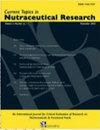辣木和桑多酚在高脂肪饮食大鼠中表现出抗肥胖和抗高脂血症的作用
IF 0.4
4区 医学
Q4 NUTRITION & DIETETICS
Current Topics in Nutraceutical Research
Pub Date : 2023-01-11
DOI:10.37290/ctnr2641-452x.21:102-108
引用次数: 0
摘要
本研究探讨了辣木叶、桑葚果和桑叶对高脂肪饮食诱导的大鼠体重和高脂血症的影响。将健康雄性大鼠随机分为5个等量组,分别为:(i)基础饲粮或阴性对照组,(ii)高脂肪饲粮组(基础饲粮+ 20%脂肪),(iii)油棕叶处理高脂肪饲粮组(高脂肪饲粮+ 10%油棕叶),(iv)桑果处理高脂肪饲粮组(高脂肪饲粮+ 10%桑叶),(v)桑叶处理高脂肪饲粮组(高脂肪饲粮+ 10%桑叶)。每天给药6周,收集各组大鼠体重数据和血液样本。研究结束时,在高脂肪饮食中添加油橄榄叶、桑葚果或桑叶的大鼠体重、总胆固醇、总甘油三酯、低密度脂蛋白水平和葡萄糖水平显著降低。此外,高脂饮食中食用油叶或桑果的大鼠血清高密度脂蛋白显著升高。辣木叶、桑果和桑叶的抗肥胖和降血脂作用为辣木和桑树作为预防肥胖和高脂血症的潜在功能性食品成分提供了支持。本文章由计算机程序翻译,如有差异,请以英文原文为准。
Polyphenols from Moringa Oleifera and Mulberry Exhibit Anti-Obesity and Anti-Hyperlipidemic Effects in Rats Fed a High-Fat Diet
This study investigated the effects of Moringa oleifera leaf, mulberry fruit, and mulberry leaf on high-fat diet-induced changes in body weight and hyperlipidemia in rats. Healthy male rats were randomly divided into five equal-sized groups that included (i) basal diet or negative control group, (ii) high-fat diet group (basal diet + 20% fat), (iii) M. oleifera leaf-treated high-fat diet group (high-fat diet + 10% M. oleifera leaf), (iv) mulberry fruit-treated high-fat diet group (high-fat diet + 10% mulberry fruit), and (v) mulberry leaf-treated high-fat diet group (high-fat diet + 10% mulberry leaf). The rats were treated daily for 6 weeks, and body weight data and blood samples were collected for each group. At the end of the study period, body weight, total cholesterol, total triglyceride, low-density lipoprotein level, and glucose level were significantly reduced in the rats fed a high-fat diet supplemented with M. oleifera leaf, mulberry fruit, or mulberry leaf. Moreover, serum high-density lipoprotein was significantly elevated in the rats on a high-fat diet receiving M. oleifera leaf or mulberry fruit. The antiobesity and antihyperlipidemic effects of M. oleifera leaf, mulberry fruit, and mulberry leaf provide support for the use of Moringa and mulberry as potential functional food ingredients for the prevention of obesity and hyperlipidemia.
求助全文
通过发布文献求助,成功后即可免费获取论文全文。
去求助
来源期刊
CiteScore
1.10
自引率
0.00%
发文量
36
审稿时长
>12 weeks
期刊介绍:
Current Topics in Nutraceutical Research is an international, interdisciplinary broad-based peer reviewed scientific journal for critical evaluation of research on chemistry, biology and therapeutic applications of nutraceuticals and functional foods. The major goal of this journal is to provide peer reviewed unbiased scientific data to the decision makers in the nutraceutical and food industry to help make informed choices about development of new products.
To this end, the journal will publish two types of review articles. First, a review of preclinical research data coming largely from animal, cell culture and other experimental models. Such data will provide basis for future product development and/or human research initiatives. Second, a critical evaluation of current human experimental data to help market and deliver the product for medically proven use. This journal will also serve as a forum for nutritionists, internists, neurologists, psychiatrists, and all those interested in preventive medicine.
The common denominator of all of the topic to be covered by the journal must include nutraceuticals and/functional food. The following is an example of some specific areas that may be of interest to the journal. i) Role of vitamins, minerals, antioxidants and phytonutrients on cardiovascular health, cancer, diabetes, ocular health, mental health, men’s health, women’s health, infant nutrition, ii) Role of herbals on human health, iii) Dietary supplements and sleep, iv) Components of diet that may have beneficial effect on human health, v) regulation of apoptosis and cell viability, vi) Isolation and characterization of bioactive components from functional foods, vii) Nutritional genomics, and viii) Nutritional proteomics.

 求助内容:
求助内容: 应助结果提醒方式:
应助结果提醒方式:


